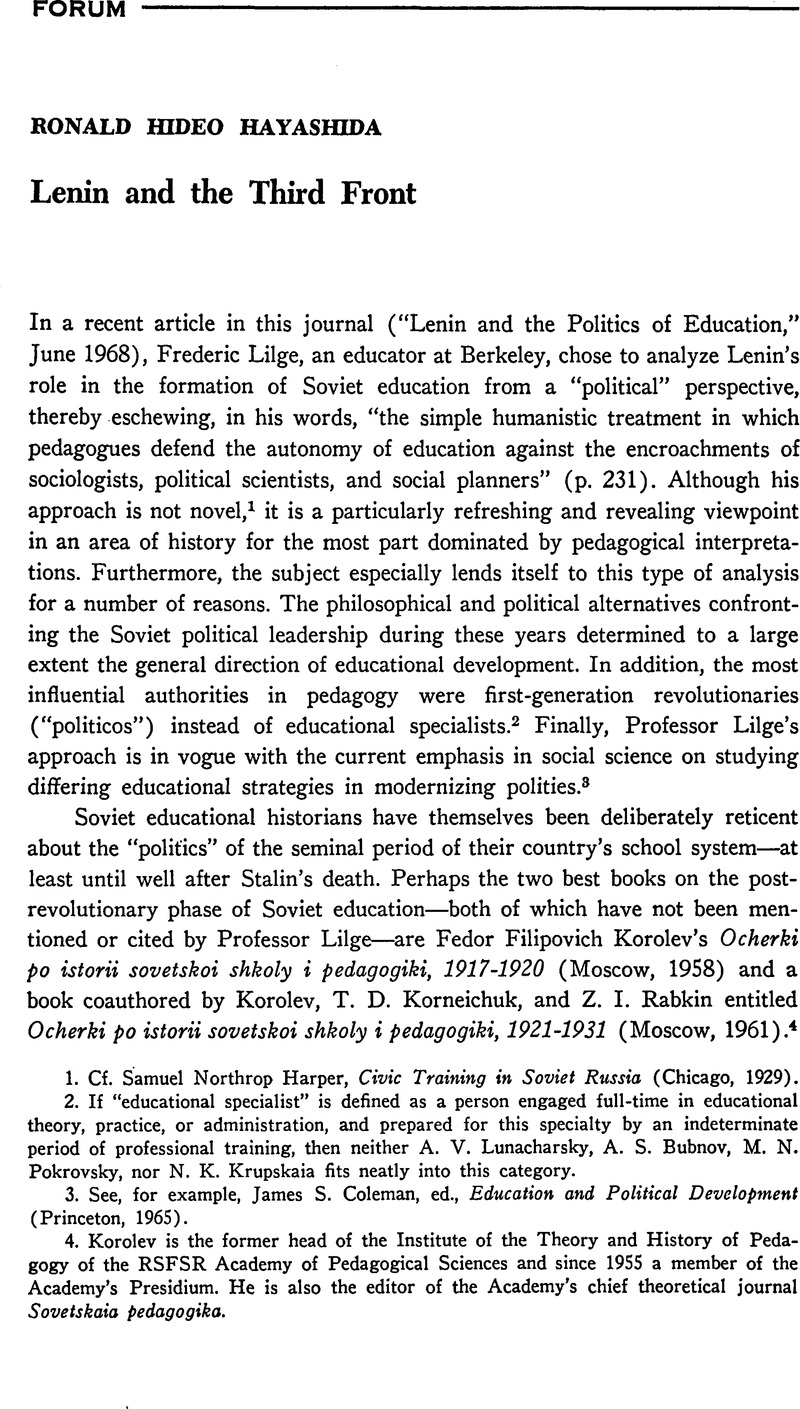Article contents
Lenin and the Third Front
Published online by Cambridge University Press: 27 January 2017
Abstract

- Type
- Forum
- Information
- Copyright
- Copyright © Association for Slavic, East European, and Eurasian Studies. 1969
References
1. Cf. Harper, Samuel Northrop, Civic Training in Soviet Russia (Chicago, 1929).Google Scholar
2. If “educational specialist” is defined as a person engaged full-time in educational theory, practice, or administration, and prepared for this specialty by an indeterminate period of professional training, then neither A. V. Lunacharsky, A. S. Bubnov, M. N. Pokrovsky, nor N. K. Krupskaia fits neatly into this category.
3. See, for example, Coleman, James S., ed., Education and Political Development (Princeton, 1965).Google Scholar
4. Korolev is the former head of the Institute of the Theory and History of Pedagogy of the RSFSR Academy of Pedagogical Sciences and since 1955 a member of the Academy's Presidium. He is also the editor of the Academy's chief theoretical journal Sovetskaia pedagogika.
5. See Jeremy R. Azrael's analysis of Soviet political development in terms of the philosophical contradiction in Lenin's State and Revolution and his What Is To Be Done? in Kassof, Allen, ed., Prospects for Soviet Society (New York, 1967), p. 59–75.Google Scholar
6. Lunacharsky, A. V., “Polozhenie narodnogo obrazovaniia na shestoi god revoliutsii,” Kommunisticheskaia revoliutsiia, no. 3 (42) (Feb. 1, 1923), pp. 7–12.Google Scholar Note his judicious use of the plural.
7. See Direktivy VKP(b) i postanovleniia sovetskogo pravitel'stva o narodnom obrasovanii: Sbornik dokumentov sa 1917-1947 gg., vol. 1, ed. N. I. Boldyrev (Moscow and Leningrad, 1947), pp. 14-16. A particularly good analysis of the gradual development of educational centralization is found in I. Zakolodkin's “Razvitie struktury Narkomprosa i ego mestnykh organov,” Narodnoe prosveshchenie, 1927, no. 11-12, pp. 45-72.
8. Korolev, Ocherki … , 1917-1920, p. 15.
9. As quoted by Shulgin, V. N., N. K. Krupskaia kak pedagog: K shestidesiatilctiin so dnia roshdeniia (Moscow, 1929), p. 15.Google Scholar
10. Korolev, Ocherki … , 1917-1920, p. 15.
11. The names S. T. Shatsky and It. N. Venttsel have again returned to pedagogical respectability in the post-Stalin period. See Shatsky, S. T., Isbrannye pedagogicheskie sochineniia, ed. Vblkovsky, A. N., Skatkin, L. N., Skatkin, M. N., and Shatskaia, V. N. (Moscow, 1958)Google Scholar and Korolev, F. F., “K. N. Venttsel'—Vidneishii predstavitel’ teorii svobodnogo vospitaniia (1857-1947),” Sovetskaia pedagogika, 1964, no. 4, pp. 73–91.Google Scholar For a development of Venttsel's ideas see his Bor'ba sa svobodnuiu shkolu (Moscow, 1907), Teoriia svobodnogo vospitaniia i ideal'ni detskii sad (St. Petersburg and Moscow, 1923; first published in 1915); Kak sozdaf svobodnuiu shkolu (Moscow, 1906), and Etika, pedagogika i politika (Moscow, 1906).
12. As quoted in Perel, I, “K voprosu o reorganizatsii mestnogd upravlencheskogo apparata po narodnomu obrazovaniiu,” Narodnoe prosveshchenie, 1924, no. 4-5, p. 158.Google Scholar The italics are mine.
13. Golos truda, the voice of the anarchosyndicalists, seems to have preferred M. Bakunin, P. Kropotkin, and others to Bogdanov. See, for example, Lebedev, N. K., Svobodnoe trtidovoe vospitanie sbomik statei (St. Petersburg and Moscow, 1921).Google Scholar
14. Krupskaia, N. K., “Rol1 Lenina v bor'be za politekhnicheskuiu shkolu,” Za kommunisticheskoe vospitanie, 1932, no. 9, pp. 31–34.Google Scholar
15. Lenin, V. I., “O politekhnicheskom obrazovanii zametki na tezisy Nadezhda Konstantinova,” Lenin o narodnom obrazovanii: Stafi i rechi (Moscow, 1957), p. 365–66.Google Scholar
16. The term “handicraftsmanship” (sometimes kustarnichestvo, sometimes remeslennichestvo) is equated with “narrow vocationalism” and “monotechnism” and is hence anathema to Soviet educators, belonging properly in the feudal era of apprenticeship training.
17. See the following works by Shulgin, V. N.: Marks % Engels v ikh pedagogicheskikh vyskasyvaniiakh, 5th supplementary ed. (Moscow, 1925)Google Scholar; Osnovnye voprosy sotsial'- nbgo vospitaiiiia 5th ed. (Moscow; 1926); Obshchestvennaia rabota shkoly i programmy GUS'a (Moscow, 1926); 0 novom uchebnike, 2nd ed. (Moscow, 1927); 0 vospitanii kommunisticheskoi morali (Moscow, 1928); N. K. Krupskaia (see note 9); Pedagogika Perekhodndi epokhi (Moscow, 1930); and Piatiletka i gadachi narodnogo prosveshchcniia (Moscow 1930). See also Krupenina, M. V., ed., Ot shkoly uchebnoi k shkole obshchestvenno-polesnogo truda (Moscow, 1927)Google Scholar, and Krupenina, M. V., Rybnikov, M. N., Sheinberg, A., and Shulgin, V., eds., Nasha rabota, vol. 1 (Moscow, 1929).Google Scholar
18. V. A. Vagariiari (Ter-Vaganian) claims that he suggested the abolition of schobls a year before Shulgin. See Vaganian's, O sisteme narodnogo obrasovaniia (Moscow, 1930)Google Scholar, and Osnovnye voprosy pedagogicheskoi diskttssii (Moscow and Leningrad, 1931).
19. See Ilin, G. D. and Tsinkes, E. M., Ob antileninskoi teorii “otmiraniia shkoly“ (Moscow and Leningrad, 1931).Google Scholar
20. As editor of Projtekhnicheskoe obraaovaniia (which became Za kachestvo kadrov in 1931), A. la. Vyshinsky, the future Soviet procurator general, was one of the more vigorous proponents of “uninterrupted production practice.”
21. See, for example, Sabsovich's, L. M. Goroda budushchego i organizatsiia sotsialisticheskogo byta (Moscow, 1929)Google Scholar, Sotsialisticheskie goroda (Moscow, 1930), SSSR cherez 10 let (Moscow, 1930); and Shauer, Iu., Chto nushno znat’ rabochemu o nepreryvnom proisvodstve (Moscow, 1929).Google Scholar G. Zinoviev also contributed to the literature on “sqcialist cities” and appears to have been an enthusiastic adherent of the idea. See his “Ot utopii k deistvitel'nosti,” in Lunin, B., comp., Goroda sotsialisme i sotsialisticheskaia rekonstruktsiia byta (Moscow, 1930), p. 12–20.Google Scholar
22. Cf. Daniels, Robert V., “The Left Communists,” Problems of Communism, 16, no. 6 (1967): 62–70.Google Scholar
23. G. D. Ilin and E. M. Tsinkes, Ob antileninskoi teorii, p. 8.
24. Ting-Yi, Lu, Education Must Be Combined with Productive Labor (Peking, 1964), p. 1–2.Google Scholar
- 1
- Cited by


